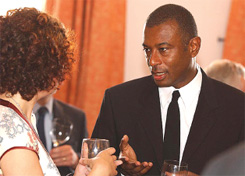|
|
 |
| |
Phillips claims rappers are modern minstrels
Novelist Caryl Phillips tells of a ridiculed black minstrel and draws parallels with today’s pigeon-holed performers, writes Tom Foot
Dancing in the Dark by Caryl Phillips Secker and Warburg, £11.99 order this book
AT the end of the 19th century,
Bert Williams - a lightskinned
Antiguan who used
to black himself up and
ridicule his own race - was the
highest paid performer in the
United States.
Williams was just 11 when he was sent to California. In 1893 he joined Martin and Seig’s Mastodon Minstrels where he met George Walker. As Williams and Walker, their comedy vaudeville act popularised the “cakewalk” dance.
In 1903,Williams sailed to England to play to a capacity crowd at the Shaftesbury Theatre for the ninth birthday of the future King Edward VIII.
Williams was perhaps the first black man to “break” the American entertainment scene. But his career, although making him rich, served only to reinforce stereotypes and demean black people.
Speaking in debate with his friend and author Graham Swift at the London Review of Books in Bloomsbury, Caryl Phillips – whose novel Dancing in the Dark has Williams as the lead character – argued the story of a black man degrading himself and his race for riches had deep parallels with today’s hip-hop scene.
“I have always had an interest in the ‘minstrelsy’ of some hip-hop artists,” says Phillips. “For many making it in the rap world is something to aspire to – but I think of it as performative bondage, being tied down to a part that degrades and debases while it appears to esteem and enrich.
“I’m fed up with it,” he says. “If you listen to rap most of it is about making money. It’s the same with the Williams’ story – make money at all costs.
“Even today people are paid, or rewarded, to be in society at a particular time. It’s still a problem. We are seeing it today in Muslim and black communities.
“Imagine if the rapper Usher decided he wanted to sing Frank Sinatra suddenly. Do you think anyone would buy his CDs? Transition to other ways of expressing yourself is very difficult.
“The world tends to immobilise you in the role you play. Once you are trapped, your life is gone. We see through history how society invents roles for us. Black people must find a way to reinvent themselves upon society.”
Relatively little is known about Bert Williams. There are no biographies and few pictures. Phillips, who studied at Oxford and now lectures at Columbia in New York, said he decided to write a novel because a biography would have been virtually impossible.
He said: “I had nothing to go on and I think that worked for me. There was no one to tell me I’m wrong – it’s just my interpretation of the character. “Williams had many components to his identity that interested me – his is a story of race obviously, but class too, nationality, sexuality, and family angst – it’s pretty much a full house.”
Graham Swift – author of the best seller Waterland – said the book was more about the “tragedy of performance” than race.
He said: “I see it as a story of a young man who could not escape his role and was rewarded for slogging it out, rather than upsetting the applecart.”
In Dancing in the Dark, Williams has to deal with the disappointment and rage of his appalled Caribbean father. Phillips – born in 1958 in the Leeward Islands, St Kitts, under British dominion – also had to deal with his father’s disappointment, and knows well the pressures of living up to social stereotype.
He said: “I grew up in Yorkshire but no one could believe it when I couldn’t dance. I am such a poor dancer. And I couldn’t play cricket either – I was absolutely hopeless.
“I could play rugby well, but my dad didn’t like that. When I plucked up the courage to tell him he shouted back: ‘Boy! I didn’t send you away to have your head stamped on by the English’.”
Phillips’ novel is his eighth, following in a long line of bestsellers. But for his friend Swift, Dancing in the Dark signalled something new – a departure into the psyche of the performer.
Phillips said:“We are all performing. When we are in rubbish jobs and we have to smile we are performers. My brother is an actor. When he is typecast as a black man and he has to say what someone else sees as a black man’s lines, he is performing.
“When a journalist calls you putting on their posh voice, they are performing. When the young boys talk the talk, that is an act. It does something to your soul.
“The book makes me think about performance – and how inequality seems to use it to its advantage.”
So where does the work of Caryl Phillips – who enjoys golf, marathons and has climbed Kilimanjaro twice – fall into this complex thread of social construction?
He says. “I’m not writing for a black audience. I’m not writing for anybody but myself. I have just been lucky. I just write words in an order and make them the best order I can. And then what do you do? You hope.”
|
| |
|
|
 |
|


